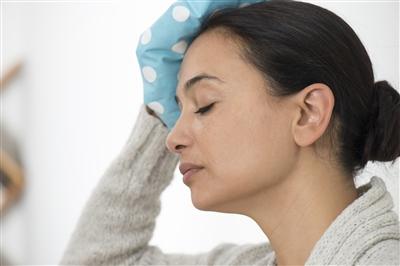Handling hormone headaches

Both men and women can suffer from headaches for any number of reasons, including head injuries, insufficient sleep and dehydration. But certain factors, such as fluctuating hormone levels, make headaches more common among women.
“When women experience fluctuating hormone levels—like during menstruation, pregnancy, or perimenopause—these levels can affect the chemicals in the brain. As a result, it’s not uncommon for women to experience more headaches,” explains Ana Recober, MD, a neurologist at Main Line Health who is board-certified in headache medicine.
Fortunately, although some of these hormonal fluctuations cannot be avoided, there is a way to reduce or eliminate the headaches they’re causing. Below, Dr. Recober explores the most common causes of hormonal headaches in women, and how to treat them.
Menstruation
Headaches are a very common symptom during a woman’s menstrual cycle and in the days preceding it. Over-the-counter pain medicines are usually enough to manage these headaches. If your menstrual headaches are severe or impacting your quality of life, your health care provider may be able to recommend a stronger medication to prevent or manage your pain.
In some cases, women who take oral contraceptives or who are interested in starting them may discuss with their health care provider how an oral contraceptive can minimize the number of headaches during their menstruation.
Birth control pills
If you recently started taking an oral contraceptive or changed your dosage, you might notice that your headaches are worsening—or improving. Women and their health care providers report varying effects.
“This really depends on the patient and the type of pill,” says Dr. Recober. “For some women, birth control pills can help manage headaches or migraines but for other women it can worsen their symptoms or cause headaches to occur more frequently.”
If you notice that your headaches are more frequent or more painful than usual, talk to your OB/GYN about alternate birth control methods or a contraceptive with a lower dose of estrogen. If you have migraine with aura, you should discuss with your health care provider what types of hormonal treatments are appropriate and which ones should be avoided.
Pregnancy

Fortunately, most women with migraine headaches see a decrease in headaches during the second and third trimesters. Importantly, headaches in pregnancy require a more tailored treatment as some common headache medications are not safe for pregnant or breastfeeding women. Your health care provider may recommend some other remedies, including applying ice packs to the head and neck. A healthy lifestyle—regular exercise, balanced and regular meals and sleep—can also help reduce pregnancy-related headaches.
If you have a history of headaches, consult your health care provider if you are planning to become pregnant so you can be proactive about prevention and treatment.
Menopause
“A common misconception is that migraine headaches stop happening after menopause," says Dr. Recober. But since most types of headaches are not exclusively related to hormonal changes, and therefore, they don’t change after menopause.
Women with menstrual migraines do typically notice an improvement in their migraine headaches after menopause, but it is also common for migraine headaches to worsen during the perimenopausal years before they get better. If this is the case, talk to your health care provider about treatment options. For some women, menopausal hormone therapy may be an option, but your provider can help you understand the benefits and risks associated with this. Other treatment methods might include physical therapy, biofeedback, lifestyle changes and medications.
Additional headache remedies

- Maintain a consistent sleep-wake cycle
- Try relaxation exercises (meditation, yoga, etc.) to alleviate stress
- Limit caffeine and alcohol intake
- Stay hydrated and eat a balanced diet and regular meals throughout the day
- Don’t smoke
If you’re living with headaches and looking for relief, talk to your primary care provider about your treatment options. “Your health care provider knows your health history and can help you find an effective treatment method for your headaches,” says Dr. Recober.
Main Line Health serves patients at hospitals and health centers throughout the western suburbs of Philadelphia. To schedule an appointment with a specialist at Main Line Health, call 1.866.CALL.MLH (225.5654).
 Content you want, delivered to your inbox
Content you want, delivered to your inbox
Want to get the latest health and wellness articles delivered right to your inbox?
Subscribe to the Well Ahead Newsletter.
